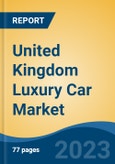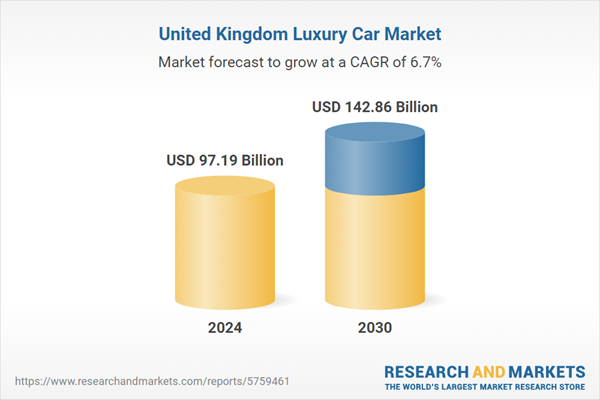Speak directly to the analyst to clarify any post sales queries you may have.
10% Free customizationThis report comes with 10% free customization, enabling you to add data that meets your specific business needs.
Key Market Drivers
Rising Disposable Incomes and Affluent Consumer Base
One of the primary drivers of the luxury car market in the United Kingdom is the rising disposable incomes among high-net-worth individuals and the expanding affluent consumer base. As the UK economy recovers and stabilizes, an increasing number of consumers possess the financial capability to invest in premium vehicles. The aspirational appeal of luxury brands, coupled with status-conscious purchasing behavior, has led to strong demand for high-end cars. Luxury vehicles are often perceived as symbols of success, prestige, and sophistication, making them attractive to executives, entrepreneurs, and celebrities.Furthermore, wealth distribution is becoming more concentrated among individuals with higher purchasing power, which continues to support the sales of luxury vehicles. Luxury automakers have capitalized on this trend by offering personalized financing options, exclusive editions, and high-end features that appeal to discerning buyers seeking both performance and exclusivity. As per the report, disposable personal income in the United Kingdom rose to GBP 421.73 billion in Q4 2024, up from GBP 413.88 billion in Q3 2024, indicating increasing consumer spending power that further supports growth in the luxury car market.
Key Market Challenges
High Cost of Ownership and Economic Uncertainty
One of the key challenges in the United Kingdom luxury car market is the high cost of ownership, which can deter potential buyers despite the prestige associated with owning such vehicles. Luxury cars are significantly more expensive to purchase, insure, maintain, and repair compared to standard vehicles. Factors such as higher vehicle excise duty (VED), costly premium fuel requirements, and expensive replacement parts contribute to the overall burden of ownership. Additionally, insurance premiums for luxury vehicles tend to be higher due to their elevated value and repair costs. For prospective buyers, especially those who are newly affluent or cautious with spending, the total cost of ownership may outweigh the perceived benefits.This challenge is further exacerbated by economic uncertainties, including inflation, interest rate hikes, and geopolitical concerns such as Brexit-related trade complexities. These macroeconomic factors impact consumer confidence and discretionary spending, potentially leading to postponement or reconsideration of luxury vehicle purchases. Even high-income individuals may exhibit cautious behavior during periods of financial volatility, impacting sales volumes for premium car brands.
Key Market Trends
Rise of Subscription and Mobility Services
The traditional model of vehicle ownership is evolving in the UK luxury car market. Affluent consumers are showing growing interest in flexible ownership alternatives such as car subscription services, short-term leasing, and luxury car-sharing platforms. These options allow users to experience multiple models without long-term commitment or ownership responsibilities. According to the British Vehicle Rental and Leasing Association (BVRLA), the UK saw a 12% year-on-year increase in flexible leasing and subscription-based models in 2024, with luxury segments contributing a significant portion.Luxury car brands have begun to respond to this shift by launching subscription-based services that offer convenience, flexibility, and exclusivity. For example, programs may include vehicle swaps, concierge services, insurance, and maintenance in a single monthly fee. This trend appeals particularly to urban consumers and millennials who prioritize access over ownership and value experience over assets.
Key Market Players
- Daimler AG (Mercedes-Benz)
- Bayerische Motoren Werke (BMW) AG
- Volvo Group
- Volkswagen Group
- Jaguar Land Rover Automotive PLC
- Fiat Chrysler Automobiles
- Aston Martin Lagonda Global Holdings PLC
- Toyota Motor Corporation (Lexus)
- Stellantis N.V.
- Ferrari S.p.A.
Report Scope:
In this report, the United Kingdom Luxury Car Market has been segmented into the following categories, in addition to the industry trends which have also been detailed below:United Kingdom Luxury Car Market, By Vehicle Type:
- Hatchback
- Sedan
- SUV/MPV
United Kingdom Luxury Car Market, By Propulsion:
- ICE
- Electric
United Kingdom Luxury Car Market, By Level of Autonomy:
- Level 1
- Level 2
- Level 3
- Level4/5
United Kingdom Luxury Car Market, By Region:
- England
- Scotland
- Wales
- Northern Ireland
Competitive Landscape
Company Profiles: Detailed analysis of the major companies present in the United Kingdom Luxury Car Market.Available Customizations:
With the given market data, the publisher offers customizations according to a company's specific needs. The following customization options are available for the report.Company Information
- Detailed analysis and profiling of additional market players (up to five).
This product will be delivered within 1-3 business days.
Table of Contents
Companies Mentioned
- Daimler AG (Mercedes-Benz)
- Bayerische Motoren Werke (BMW) AG
- Volvo Group
- Volkswagen Group
- Jaguar Land Rover Automotive PLC
- Fiat Chrysler Automobiles
- Aston Martin Lagonda Global Holdings PLC
- Toyota Motor Corporation (Lexus)
- Stellantis N.V.
- Ferrari S.p.A.
Table Information
| Report Attribute | Details |
|---|---|
| No. of Pages | 88 |
| Published | August 2025 |
| Forecast Period | 2024 - 2030 |
| Estimated Market Value ( USD | $ 97.19 Billion |
| Forecasted Market Value ( USD | $ 142.86 Billion |
| Compound Annual Growth Rate | 6.6% |
| Regions Covered | United Kingdom |
| No. of Companies Mentioned | 10 |









